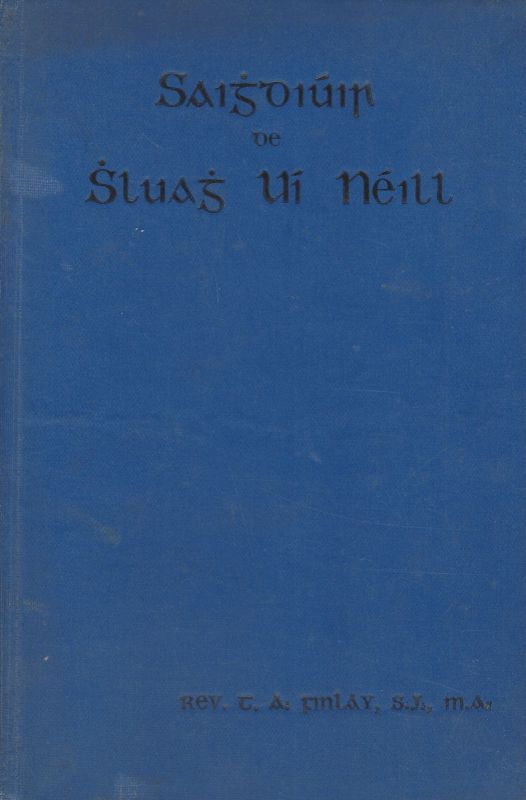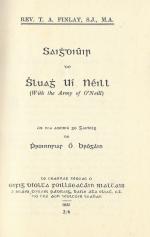Finlay, Saighdiúir de shluagh Uí Néill (With the Army of O'Neill).
Saighdiúir de shluagh Uí Néill (With the Army of O’Neill). Ar na-a aistriú go Gaedhilg do Phroinnsias Ó Brógáin.
Baile Átha Cliath [Dublin], Oifig Díolta Foillseacháin Rialtais, 1935. Octavo. 297 pages. Original Hardcover. Binding slightly stained only. Overall in very good condition with only minor signs of external wear. Interior excellent.
Thomas Aloysius Finlay, S.J. (1848 – 1940) was an Irish Catholic priest, economist, philosopher and editor.
He was born on 6 July 1848 at Lanesborough, the son of William Finlay, an engineer, and his wife Maria Magan. He was educated at St Augustine’s College, Cavan, and became a novice of the Society of Jesus in 1866. He then spent time in France, Rome, and Germany where he encountered Prussian agricultural methods. He returned to Ireland in 1873. Finlay founded and edited the magazines Lyceum, New Ireland Review and Studies. He helped found the Messenger of the Sacred Heart, the Irish Monthly and the Irish Homestead. He was auditor of the Literary and Historical Society (University College Dublin) in 1883-1884. He was, in turn, professor of classics, of philosophy, and of political economy at University College Dublin from 1903 to 1930. With Horace Plunkett he helped found the Irish Agricultural Organisation Society, and was a member of the 1895 Recess Committee which led to the establishment of the Department of Agriculture and Technical Instruction, a forerunner of the Department of Agriculture. He was a Commissioner of National Education, chaired the Committee on Intermediate Education, and was chairman of the trustees of the National Library. He was president of the Statistical and Social Inquiry Society of Ireland between 1911 and 1913. (Wikipedia)
Hugh Dubh O’Neill, 5th Earl of Tyrone (″Black Hugh”, meaning “black-haired” or “dark tempered”) (1611–1660) was an Irish soldier of the 17th century. He is best known for his participation in the Irish Confederate Wars and in particular his defence of Clonmel in 1650. O’Neill was a member of the O’Neill dynasty, the leaders of which left Ireland in the flight of the Earls in 1607. Hugh Dubh’s father, Art Óg O’Neill, was among those exiles who made careers for themselves in the Spanish Army of Flanders. Hugh Dubh was, as a result, born in Brussels in 1611 and grew up in the Irish military community there, becoming a professional soldier and serving in the Irish regiment of the Spanish army in Flanders during the Eighty Years’ War against the United Provinces of the Netherlands.
In 1642, his uncle, Owen Roe O’Neill, organised the return of 300 Irish officers in the Spanish service to Ireland to support the Irish Rebellion of 1641. O’Neill’s men became the nucleus of the Ulster army of Confederate Ireland – a de facto independent Irish state. Hugh Dubh was captured early in the war by Scottish Covenanter enemies, but was exchanged back to his own side after the Confederate victory at the Battle of Benburb in 1646. He subsequently rose to prominence after the death of his commander, Owen Roe O’Neill, in 1649.
In 1649, after the onset of the Cromwellian conquest of Ireland, Hugh Dubh was sent south with 2,000 of the best Ulster troops to defend southern Ireland. He distinguished himself at the Siege of Clonmel in May 1650, inflicting the worst casualties ever experienced by the New Model Army. He was then made commander of the defenders at the Siege of Limerick (1650-51), fighting off the Parliamentarians’ first attempt to take the city in late 1650. However, the following year, Henry Ireton besieged the city again, eventually forcing Hugh Dubh to surrender when the city’s population was dying of hunger and plague, and part of his garrison mutinied against him. Ireton himself died of disease. Under the terms of surrender, Hugh Dubh was to be executed for his stubborn defence of the city, but the Parliamentarian general Edmund Ludlow did not carry out the sentence and instead sent Hugh Dubh into imprisonment in the Tower of London.
Hugh Dubh’s imprisonment was cut short by the intervention of the Spanish Ambassador to England, who argued that Hugh Dubh was a Spanish subject. Hugh Dubh was subsequently released into Spanish custody on condition that he would not serve in campaigns against English forces. He did not, therefore, return to Flanders, but was posted to Spain, where he became a General of Artillery, helping to suppress a rebellion (known as the Reaper’s War) in Catalonia. He became the Spanish recognised 5th Earl of Tyrone upon the death of his first cousin, Hugh Eoghan. In around 1660, after the English Restoration, Hugh Dubh wrote to Charles II and asked for his family’s ancestral lands to be restored, and that he be made the English Earl of Tyrone. However, Charles did not grant the request and Hugh Dubh died of disease later that year. (Wikipedia)
- Keywords: Collection Tadhg Ó Murchú (This is a book from his personal reference library) · From the library of Tadgh Ó Murchu · Gaeilge · Gaeilge – Rare · Gaelic · Gaelic Language · Irish History · Irish Literature
- Language: Gaeilge
- Inventory Number: 101408AB
EUR 95,--
© 2024 Inanna Rare Books Ltd. | Powered by HESCOM-Software












